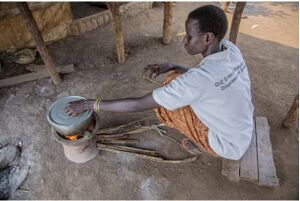ESDS Country Portrait Ethiopia - Factsheet
Background
Focusing on the Global Compact on Refugees (GCR) objectives of easing the pressure on host communities and enhancing the self-reliance of refugees, ESDS Ethiopia is working together with UNHCR, the Refugee and Returnees Services (RRS), the Ministry of Water, Irrigation and Energy, public institutions on the federal, regional and local level, private sector companies, and local refugee and host communities. The project implements marketbased pilot interventions in the Gambella region, supporting UNHCR, RRS and other relevant local governmental partners to respond to energy related challenges. The project focuses on cooking and other household energy solutions, as well as on sustainable energy supply for humanitarian operations, which are currently dependent on environmentally harmful diesel generators.
| Project Name | Energy Solutions for Displacement Settings Ethiopia (ESDS) |
| Political Partner | Ministry of Water, Irrigation and Energy |
| Donor | Federal Ministry for Economic Cooperation and Development (BMZ) |
| Focus Region | Gambella |
| Implementing Partner | UNHCR |
| Duration | 11/2019 – 12/2024 |
Project Information
An emerging region with vast natural resources, Gambella hosts roughly 360,520 refugees, in addition to a local population of 430,000 people (as of February 2022). Low availability of energy services in the region leads to extremely high pressure on natural resources and deforestation. This imposes a heavy burden on the relatively small host community.The ESDS project objective is to improve access to sustainable energy services in displacement settings for humanitarian partners, households, and social institutions. This is achieved through technical advisory, the implementation of pilot, market-based interventions and the collection and dissemination of lessons learned and good practices. The following three main components are contributing to this goal.
1. Improving the Policy Framework
Supporting the Ethiopian government to provide market-based and sustainable energy solutions to 3 million people in refugee hosting areas, GIZ collaborates with UNHCR and RRS by strengthening the policy framework on energy in humanitarian settings. To this end, the ESDS project supports coordination and exchange of agenda through the steering structure of the Energy and Environment Working Group under UNHCR and facilitates the development of relevant strategies such as the multi-actor cooking fuel strategy. The intervention area also aims to support the continuous facilitation of policy dialogues and capacity building for local and regional governmental stakeholders. This way, the strategy will be mainstreamed in sector planning at national level by the Government to foster sustainable market-based energy access in humanitarian settings and will increase the purchasing power of refugees. The process is also strengthened by sharing of lessons learnt on national and global work levels.
2. Greening the Humanitarian Infrastructure
In order to support humanitarian actors in Gambella to minimise costs and protect the environment, ESDS provides technical and regulatory advice to UNHCR for switching to renewable energy sources and increasing energy efficiency. The advisory services have been extended to other UNHCR offices such as Melkadida, Assosa, Jijjiga and UNHCR country office in Addis Ababa. The project also engages with the private sector towards sustainable energy provision in humanitarian operations by developing guiding manuals and supporting with experience in sharing platforms from other countries. The project develops best practices, such as guidelines on energy efficiency for UNHCR offices globally and RRS, including operation and maintenance.
3. Increasing Energy Access for Households and Social Institutions
Benefiting both refugees and host communities in Gambella, ESDS promotes improved access to energy related services, as well as improved cooking solutions for households, improved social services, and small businesses through market-based approaches. As part of these approaches, ESDS supports the establishment of a briquetting plant for the profitable production of alternative fuels, and an energy kiosk to provide energy services, including O&M and e-waste management. The component also includes matchmaking with the private sector, and awareness raising campaigns on topics such as improved cooking, alternative fuels and productive uses of energy. The ESDS project facilitates Business to Business (B2B) and marketing events to create market linkages between market actors such as Improved Institutional Cookstoves (IICS) producers and social institutions that serve the refugee community through a school feeding programme.
The factsheet can be downloaded here:
Partners
GIZ's Energy Solutions for Displacement Settings (ESDS) project cooperate with UNHCR to enhance the access to sustainable energy in displacement contexts, and the Energypedia page has been created to share learnings across various practitioners to spur the development of clean energy solutions.


















